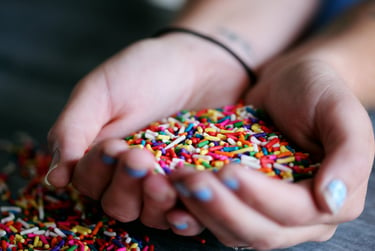

Are You Eating More Sugar Than You Should?
Many of us consume significantly more sugar than we realize in the fast-paced world of today. There are hidden sugars in everything, including our morning coffee, snacks, and even "healthy" foods. The majority of us, in actuality, consume far more sugar on a daily basis than what our bodies truly require. We'll explore the daily recommended sugar intake, sugar's hidden sources, and the health risks associated with excessive sugar consumption in this post. We'll also discuss how to maintain healthy blood sugar levels through exercise, avoiding sugar-related habits, and balancing your body's sugar levels.
Are You Consuming More Sugar Than Recommended?
Today's average person consumes over 17 teaspoons (68 grams) of sugar everyday, which is far more than the daily allowances advised by health authorities. In addition to the World Health Organization (WHO),
25 grams (6 teaspoons) for women (100 calories)
36 grams (9 teaspoons) for men (150 calories)
12 grams (3 teaspoons) for children (48 calories)
This added sugar comes from sources we might not expect. Processed foods, condiments, and even beverages marketed as "healthy" can contain excessive amounts of sugar, which can negatively impact your health.
Sugar Requirements by Age and Calories
Age Group
Recommended Daily Sugar (grams)
Daily Caloric Intake (calories)
Children (4-6)
12-19 grams (3-5 teaspoons)
1,200-1,400
Children (7-10)
19-24 grams (5-6 teaspoons)
1,600-1,800
Teens (11-18)
24-30 grams (6-7 teaspoons)
2,000-2,200
Adults (19+)
Women: 25 grams (6 teaspoons)
1,800-2,200
Men: 36 grams (9 teaspoons)
2,000-2,400
Be aware that the sugars mentioned here are added sugars, not the sugars that are included in whole grains, fruits, and vegetables and are part of a balanced diet.
Hidden Sources of Sugar
You might be surprised to learn that added sugars are present in many of the foods we eat. The following are some typical offenders that increase your daily sugar intake:
1. Sugary Drinks:
A lot of sugar can be found in sodas, fruit juices, energy drinks, and even some flavored water.
2. Cereals for Breakfast:
Countless "whole grain" and "healthy" cereals have startlingly high sugar content.
3. Yogurts:
To improve flavor, sugar is frequently added to flavored yogurts. Instead, go for the unsweetened, simple varieties.
4. Sauces and Dressings:
A lot of sugar can be found in ketchup, barbecue sauce, and salad dressings. When using these condiments, use caution.
5. Granola bars and Snacks:
A lot of snack bars that are touted as healthier options are actually loaded with sweets that aren't visible on the outside.
6. Baked goods and desserts:
Some of the most obvious sugar-filled foods include cakes, cookies, pastries, and ice creams, but people nevertheless eat them frequently.
Impact of Excessive Sugar on Your Body
When you consume too much sugar, especially from processed foods, your blood sugar levels spike rapidly. Over time, this can lead to several health issues, such as:
• Weight Gain:
Excess sugar is stored as fat in the body, leading to weight gain and obesity.
• Diabetes:
Constant sugar spikes can increase the risk of developing insulin resistance, eventually leading to type 2 diabetes.
• Heart Disease:
High sugar consumption has been linked to an increased risk of heart disease, high blood pressure, and inflammation.
• Liver Problems:
Excess sugar is also processed by the liver, and when consumed in high amounts, it can lead to fatty liver disease.
• Skin Aging:
High sugar levels contribute to the formation of harmful molecules called AGEs, which accelerate the skin’s aging process.
What to do to Balance Sugar Levels in the Body
Maintaining balanced sugar levels is crucial for overall health. Here are some tips to help you manage sugar intake:
1. Read Labels:
Be mindful of added sugars when buying packaged foods. Look for names like high-fructose corn syrup, cane sugar, dextrose, and more.
2. Choose Whole Foods:
Opt for fresh fruits, vegetables, whole grains, and lean proteins. These foods have natural sugars that don’t spike your blood sugar levels.
3. Drink Water:
Sugary drinks can easily exceed your daily sugar requirement. Stick to water, unsweetened tea, or black coffee.
4. Portion Control:
Reduce portion sizes of sugar-heavy treats. If you enjoy dessert, have a smaller amount and savor it.
5. Use Natural Sweeteners: Instead of refined sugar, consider using honey, maple syrup, or stevia in moderation.
Increase Fiber Intake: Fiber slows down the absorption of sugar into the bloodstream, helping to prevent spikes in blood sugar.
Activities to Keep Sugar Levels Balanced
Regular physical activity is one of the best ways to regulate blood sugar levels. Exercise helps your muscles use glucose for energy, which in turn lowers blood sugar.
Here are some recommended activities:
Yoga: Certain yoga poses help to activate the pancreas and improve insulin function. Try poses like:
Sun Salutations (Surya Namaskar)
Half Lord of the Fishes Pose (Ardha Matsyendrasana)
Seated Forward Bend (Paschimottanasana)
· Aerobic Exercises: Activities like walking, swimming, and cycling help improve insulin sensitivity and lower blood sugar levels.
· Strength Training: Building muscle through weightlifting or bodyweight exercises (like push-ups or squats) helps the body process glucose more efficiently.
· High-Intensity Interval Training (HIIT): Short bursts of intense exercise followed by rest periods can be effective in lowering blood sugar and improving cardiovascular health.
Bad Sugar Habits to Avoid
We all have habits that lead to consuming too much sugar without realizing it. Here are some bad sugar habits to watch out for:
1. Skipping Breakfast and Bingeing Later: Skipping meals can lead to overeating sugary snacks or heavy meals later in the day, causing sugar spikes.
2. Drinking Sugary Beverages: Soda, sweetened coffee, and flavored drinks are major sources of hidden sugars. Opt for water or herbal teas instead.
3. Late-Night Snacking: Eating sugary snacks late at night can lead to high sugar levels while you sleep, which is harmful to your metabolism.
4. Eating Processed Foods: Processed foods often contain a lot of added sugar, which you may not even taste. Cook at home more often, and choose fresh ingredients.
5. Not Reading Labels: Many seemingly healthy foods, like energy bars, fruit-flavored yogurt, or canned soups, have sneaky amounts of sugar. Always check labels for added
6. Emotional Eating: When stressed, many turn to sugary comfort foods. Try healthier coping mechanisms like taking a walk or practicing mindfulness instead.
Excessive sugar consumption is a common problem that can lead to serious health issues over time, including diabetes, heart disease, and obesity. By being mindful of what we eat, choosing whole foods, and incorporating regular physical activity into our routine, we can manage our sugar levels and protect our long-term health. Keep an eye on hidden sugars, avoid bad habits, and stay active with practices like yoga and strength training to maintain healthy blood sugar levels.
www.lifehicss.com
Are You Eating More Sugar Than You Should?
www.lifethicss.com


